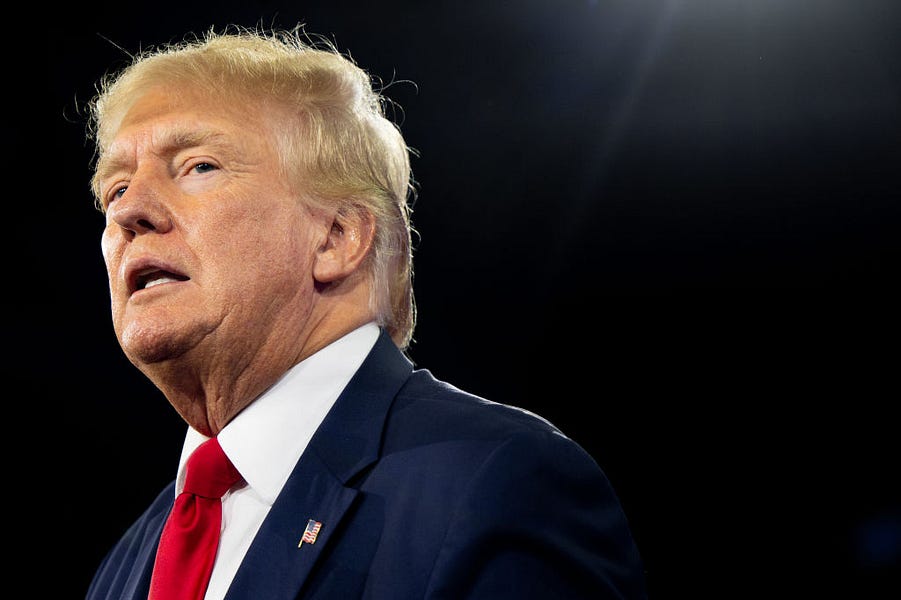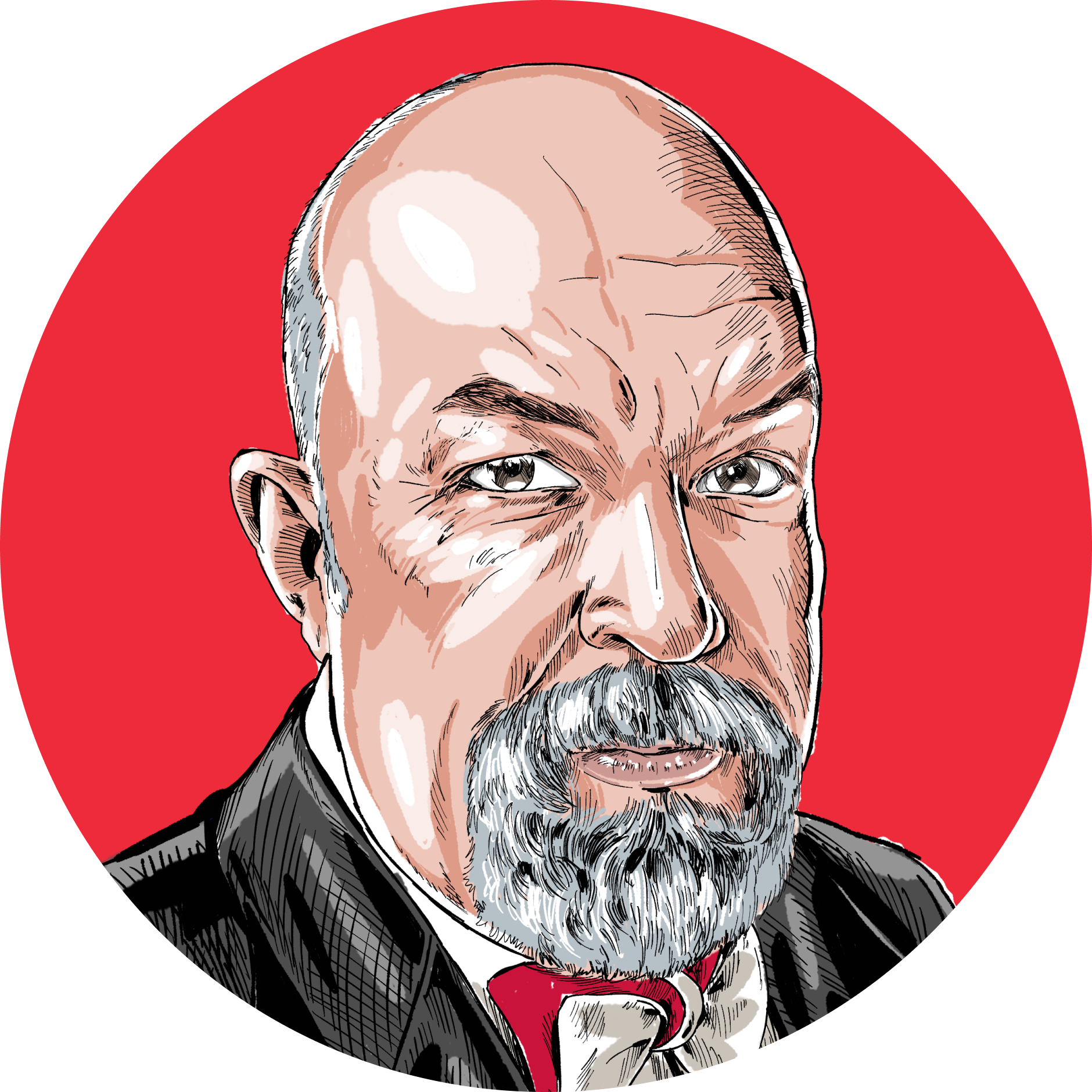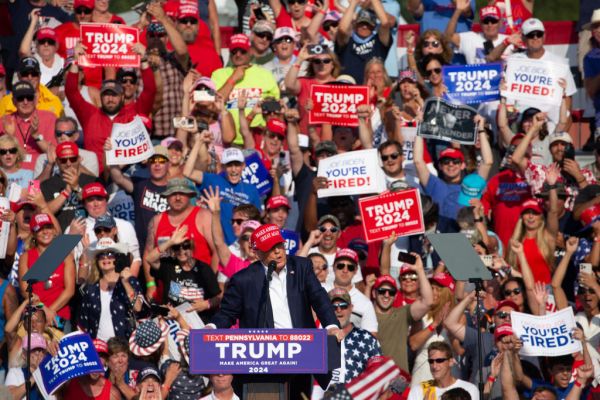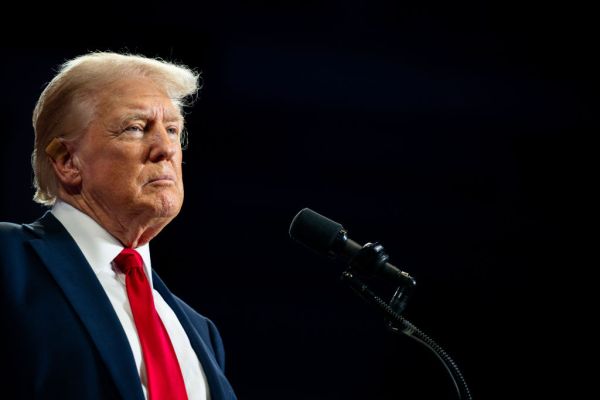The thing about Donald Trump’s “Big Lie” is that it is: 1. big and 2. a lie. Trump has now filed a $475 million lawsuit against CNN, insisting that the news channel stop referring to his lies as “lies.”
That’s High Trumpism: lying about lying while putting your hand out and asking for money.
CNN’s lawyers can rest easy. The lawsuit (which I encourage you to read) is an amateurish dog’s breakfast of cut-and-paste hackwork, a slop pail of whining and whimpering that overlooks the one absolute defense against a libel claim: truth. The claims of fact about Trump made by CNN’s talking heads have been, for the most part, true. The analysis has been at times hysterical and irresponsible—this is CNN—but, as CNN’s lawyers point out, even the letter of complaint Trump’s team sent to CNN in July demanding the removal and retraction of a few dozen segments and articles didn’t allege any particular falsehood as such.
CNN’s legal team, which must be enjoying the heck out of this, responded:
CNN has had the opportunity to review your letter of July 21, 2022, and to evaluate your demand to take down and retract the 34 articles and television segments you identify as defamatory, and to cease referring to representations made by former President Trump regarding the outcome of the 2020 presidential election as “lies.” We decline your request.
While we will address the merits of any lawsuit should one be filed, we note that you have not identified a single false or defamatory statement in your letter.
The lawsuit does raise a few questions, some of them trivial and some serious. But let’s start with the trivium, because it’s a little more fun. The big question: Why doesn’t Donald Trump have better lawyers? He is a former president of the United States and, while it seems certain that he has grossly overstated his wealth for years, he probably has enough money to afford a decent attorney. (Maybe it’s the “decent” part, not the money.) Instead, in this matter Trump’s ace legal team is once again being led by Lindsey Halligan, whose legal experience has mostly involved insurance companies fighting out property-damage claims with landlords. She “focuses on the litigation of numerous water, fire, SIU fraud, vandalism and theft claims on both residential and commercial properties,” according to her law firm bio. As far as I can tell, she has never tried a libel case, much less one involving such a figure as a former president or such a defendant as a major news organization. I emailed to ask her whether she’s ever been involved in libel litigation; as of this writing, she hasn’t responded.
Halligan, who seems to be unfamiliar with the basic procedures of some of the courts in which she has found herself practicing of late, is trying to have the case heard in south Florida (CNN is based in Atlanta, where it shares space with an Arby’s) on the astoundingly original legal theory that there are people in south Florida who watch CNN. There are more Twitter screen captures in the filing than you might ordinarily expect from litigation involving a man who was, until recently, president of the United States of America.
This is about par for the course with Trump’s lawyers of late: A Florida judge “informed two lawyers representing former President Donald J. Trump, neither of them licensed in the state, that they had bungled routine paperwork to take part in a suit filed following the F.B.I.’s search this month of Mr. Trump’s Mar-a-Lago home and private club,” the New York Times notes. Reading the recent libel suit, my question wasn’t whether the lawyers in question are licensed in Florida but how they got themselves licensed anywhere.
Trump’s lawyers (the other name signed to the suit is that of James Trusty, a Washington-based wire-fraud and money-laundering guy, because, well, you know) don’t quite seem to know how libel law works. Or maybe they just don’t care: Trump never says no to money, but it is plausible that he is just paying them to harass CNN without any real hope of a settlement. (I can’t say whether this rises or sinks to the legal definition of “frivolous,” but I hope they got paid in advance.) For example, the climactic section of the lawsuit charges:
By comparing the Plaintiff to violent dictators and repeatedly using inflammatory language, such as “Trump’s big lie,” CNN knowingly made false and defamatory statements about the Plaintiff, or at the very least, made those statements with reckless disregard for their truth or falsity, thereby acting with actual malice.
A comparison is not a claim of fact and is generally not subject to a true-false judgment. If I write, “Jonah Goldberg is the Jeffrey Dahmer of columnists, and he can bite me,” Jonah doesn’t have a legal claim against me; if I write, “Jonah Goldberg is, in fact, a murdering cannibal,” then he does. It would be weird to claim that Donald Trump is literally Adolf Hitler, of course, but even though insisting that he is the moral equivalent of Hitler would be defensible as a legal matter, CNN hasn’t actually done that either, at least not in the most directly relevant instances cited. Fareed Zakaria, whose criticism seems to have irked the former president, qualified his remarks thus: “Let’s be very clear. Donald Trump is not Adolf Hitler.” I know this because he is quoted saying that in Trump’s lawsuit—i.e., the text of Trump’s lawsuit makes a pretty good case for why that lawsuit is without merit.
(Also: Let’s emphasize former president: The lawsuit identifies the plaintiff as “President Donald J. Trump,” when there is no such person. This is a republic with elected offices, not a monarchy with life peerages.)
The lawsuit goes on to make any number of ludicrous complaints that do not actually have anything to do with libel per se. For example, Anderson Cooper interviewed Linda Ronstadt, who doesn’t think much of Trump and said so. “No matter how lovely a voice she may have, Ronstadt is a singer, not a historian,” the lawsuit sniffs.
But the main complaint is focused on the use of the term “big lie,” which Trump objects to because of its Nazi associations. Even if we were to concede that the comparison is unfair—it isn’t; if you don’t want to be called on your big lie, don’t tell a big lie—it isn’t libelous, or even close to libelous.
Of course, the big problem for Trump’s complaint is that CNN’s characterization of Trump’s election claims as a “big lie” is, as a matter of demonstrable fact, true.
This probably will be laughed out of court, as it deserves to be. But not every libel complaint from such a figure deserves to be dismissed out of hand. With all due respect to the federal judge who dismissed the case, the New York Times did pretty obviously libel Sarah Palin by claiming that the man who shot Gabby Giffords not only was inspired by a Palin campaign ad but that “the link to political incitement was clear,” when in fact there was no such link at all, much less a clear one, and that Palin’s name was dragged into the libelous editorial (which otherwise had nothing to do with her) purely for the purpose of injuring her reputation and damaging her political career—i.e., for the purpose of defamation. The malice and reckless disregard for the truth, the legal bases for a libel claim, were self-evident.
The United States is a litigious society, but defamation is one of the few areas of our public life that probably doesn’t produce enough lawsuits—and certainly not enough winning lawsuits. This is the golden age of consequence-free defamation: Ask David French. (Or me: If you’ve ever seen me quoted defending Donald Sterling’s racist shenanigans, you might be interested to know that not only had I never written about the guy, I’d never heard of him until socialist lawyer and blogger Matt Bruenig for some inexplicable reason made up a completely fictitious quotation and attributed it to me—on Twitter, of course.) A big settlement in a libel case will not restore the injured party’s reputation—not with a public discourse dominated by Twitter and willful, motivated ignorance—but the example would be a beneficial one.
Trump’s suit deserves to be mocked, and it will be. It most likely won’t be much of an inconvenience to CNN, whose lawyers will have a chance to justify their retainers. It will probably make it a little less likely than it already is that public figures with legitimate complaints will be able to secure their interests in court—one more way in which Donald Trump will have left this country and its institutions worse than he found them.









Please note that we at The Dispatch hold ourselves, our work, and our commenters to a higher standard than other places on the internet. We welcome comments that foster genuine debate or discussion—including comments critical of us or our work—but responses that include ad hominem attacks on fellow Dispatch members or are intended to stoke fear and anger may be moderated.